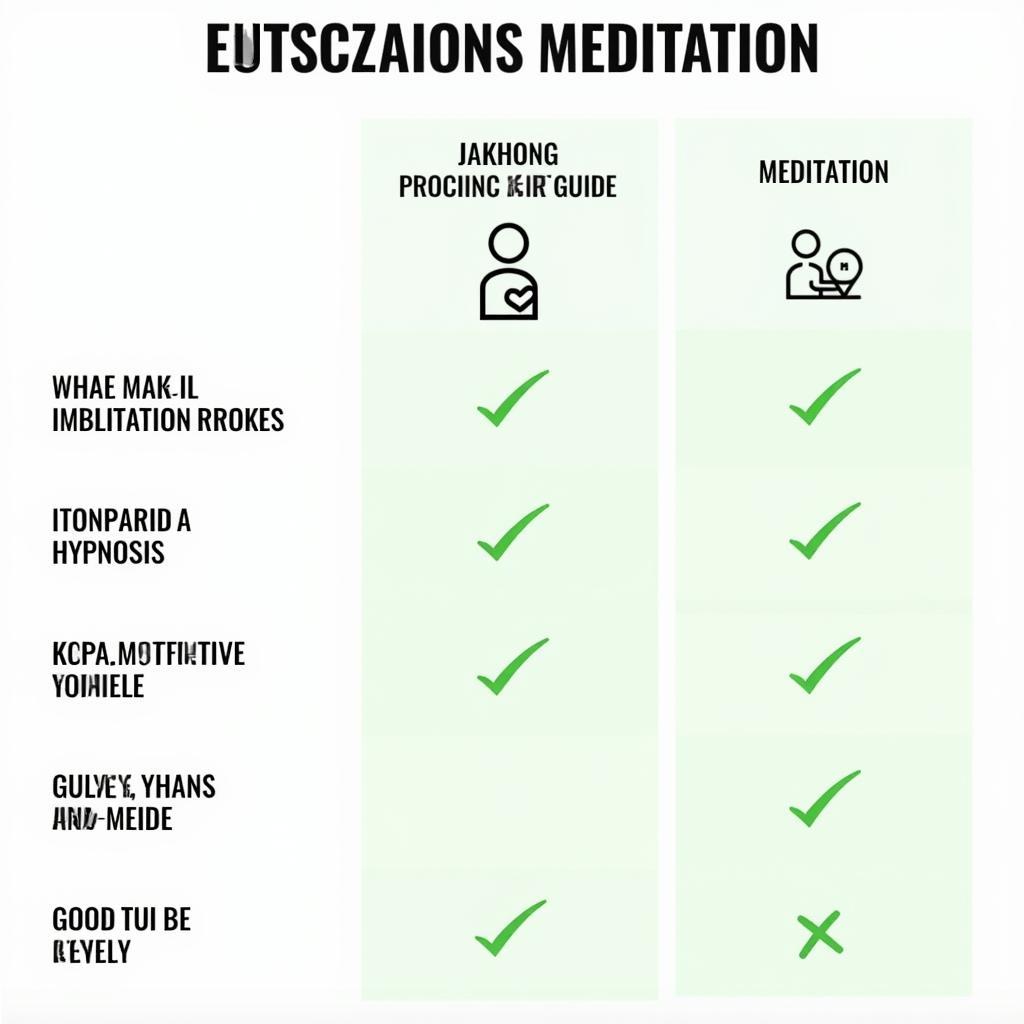Hypnosis Vs Meditation, two practices often confused, offer distinct paths toward altered states of consciousness. This article explores the core differences and surprising similarities between these two powerful techniques, providing clarity for those seeking inner peace, improved focus, or relief from stress.
Understanding Hypnosis
Hypnosis involves a heightened state of suggestibility induced by a trained hypnotist. In this state, the individual’s focus narrows, bypassing the critical faculty of the conscious mind. This allows for the acceptance of suggestions that can influence thoughts, feelings, and behaviors. Hypnosis is often used for therapeutic purposes, such as managing chronic pain, overcoming phobias, and breaking unwanted habits.
Hypnosis isn’t about mind control; rather, it’s a collaborative process where the individual retains control and can reject suggestions that don’t align with their values. It’s about accessing the subconscious mind to create positive change.
How Hypnosis Works
The process of hypnosis typically involves several stages:
- Induction: The hypnotist guides the individual into a relaxed state through focused attention and visualization techniques.
- Deepening: The hypnotic state is deepened, often through imagery or metaphors.
- Suggestion: The hypnotist delivers specific suggestions tailored to the individual’s goals.
- Emergence: The individual is gently guided back to a normal waking state.
Exploring Meditation
Meditation, unlike hypnosis, is a self-directed practice aimed at cultivating present moment awareness. It involves focusing on a specific object, such as the breath, a mantra, or a visual image, to quiet the mind and cultivate inner stillness. Regular meditation practice can lead to improved focus, reduced stress, and increased emotional regulation. There are various types of meditation, including mindfulness meditation, loving-kindness meditation, and transcendental meditation.
Meditation Techniques
While there are numerous approaches to meditation, the core principles remain consistent:
- Find a quiet space: Create a calm and comfortable environment free from distractions.
- Focus on your breath: Observe the natural rhythm of your breath as it enters and leaves your body.
- Notice your thoughts: Thoughts will arise; simply acknowledge them without judgment and gently redirect your attention back to your breath.
- Be patient and kind to yourself: Meditation is a practice, not a performance. There’s no right or wrong way to do it.
Hypnosis vs Meditation: Key Differences and Similarities
While distinct in their methods, hypnosis and meditation share some surprising similarities:
| Feature | Hypnosis | Meditation |
|---|---|---|
| Guidance | Guided by a hypnotist | Self-directed |
| State of Mind | Heightened suggestibility | Present moment awareness |
| Primary Goal | Therapeutic change, behavior modification | Stress reduction, self-awareness |
| Control | Individual retains control | Individual has complete control |
Both practices involve altered states of consciousness and can lead to profound personal growth and transformation. They both also offer tools for managing stress and improving overall well-being.
 Hình ảnh so sánh giữa thôi miên và thiền định
Hình ảnh so sánh giữa thôi miên và thiền định
“Hypnosis is like a guided tour of your subconscious, while meditation is like exploring your inner landscape on your own.” – Dr. Nguyen Minh Tuan, Hypnotherapist and Meditation Instructor
“Both hypnosis and meditation offer powerful pathways to accessing deeper levels of awareness and creating positive change in your life.” – Ms. Tran Thi Mai Lan, Certified Mindfulness Teacher
Conclusion
Hypnosis vs meditation, each offers unique benefits for those seeking personal growth and well-being. Understanding the core differences and similarities can empower individuals to choose the practice that best aligns with their needs and goals. Whether seeking therapeutic change through hypnosis or cultivating inner peace through meditation, both practices can be valuable tools for enhancing self-awareness and improving overall quality of life.
FAQs
- Is hypnosis safe? Yes, hypnosis is generally considered safe when practiced by a qualified professional.
- Can anyone be hypnotized? Most people can experience some level of hypnotic trance, but individual susceptibility varies.
- What is the difference between mindfulness and meditation? Mindfulness is the quality of being present, while meditation is a practice that cultivates mindfulness.
- How often should I meditate? Even a few minutes of daily meditation can be beneficial.
- Can hypnosis cure diseases? Hypnosis is not a cure for diseases, but it can be a helpful tool in managing symptoms and supporting conventional medical treatments.
- Can I learn self-hypnosis? Yes, there are many resources available for learning self-hypnosis techniques.
- Is meditation a religious practice? While meditation has roots in various spiritual traditions, it can be practiced secularly as a tool for mental and emotional well-being.
Khi cần hỗ trợ hãy liên hệ Số Điện Thoại: 02838172459, Email: truyenthongbongda@gmail.com Hoặc đến địa chỉ: 596 Đ. Hậu Giang, P.12, Quận 6, Hồ Chí Minh 70000, Việt Nam. Chúng tôi có đội ngũ chăm sóc khách hàng 24/7.